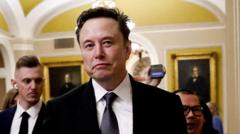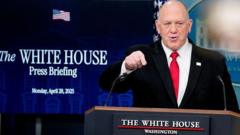A federal judge has issued a preliminary injunction preventing Elon Musk's newly formed Department of Government Efficiency (Doge) from accessing sensitive Treasury Department records, a ruling that reflects a critical legal confrontation over data privacy and government transparency involving Musk, state officials, and federal policies.
Judge Halts Musk's Access to Treasury Records Amid Legal Action

Judge Halts Musk's Access to Treasury Records Amid Legal Action
Federal judge's injunction safeguards sensitive financial data from Musk's initiative.
On Saturday, U.S. District Judge Paul A. Engelmayer blocked the initiative under challenging circumstances as 19 state attorneys general brought a lawsuit against the Trump administration concerning the data access. The lawsuit claimed that under federal law, Musk, serving as a "special government employee," and Doge, which lacks official government status, should not have been granted access to detailed personal financial data of millions of Americans.
While the court did not receive immediate commentary from prominent figures including the White House, President Trump, or Musk himself, the ruling has been framed as a response to increasing concerns about potential risks related to sensitive data handling and cybersecurity. In his order, Judge Engelmayer expressed that the states involved would encounter "irreparable" harm without immediate legal relief due to rising risks of data breaches and unauthorized disclosures.
The injunction outlined specific restrictions: only civil servants with appropriate background checks are allowed access to Treasury records needed for their official duties. Both Musk's team and any other unauthorized individuals were ordered to eliminate any copies of the sensitive records in their possession. The ruling establishes that these conditions will hold until the next scheduled court hearing on February 14.
Musk's involvement and the ensuing controversy highlight broader discussions on governmental efficiency versus data protection and privacy. His efforts through Doge have initiated significant changes within federal agencies, notably at the U.S. Agency for International Development (USAID), which has faced major cuts amid a reorganization aimed at reducing costs.
As this legal battle unfolds, the implications of the court ruling could set precedents on how data access and privacy measures are handled within the federal government, reflecting the ongoing tension between technological advancement and regulatory oversight.
While the court did not receive immediate commentary from prominent figures including the White House, President Trump, or Musk himself, the ruling has been framed as a response to increasing concerns about potential risks related to sensitive data handling and cybersecurity. In his order, Judge Engelmayer expressed that the states involved would encounter "irreparable" harm without immediate legal relief due to rising risks of data breaches and unauthorized disclosures.
The injunction outlined specific restrictions: only civil servants with appropriate background checks are allowed access to Treasury records needed for their official duties. Both Musk's team and any other unauthorized individuals were ordered to eliminate any copies of the sensitive records in their possession. The ruling establishes that these conditions will hold until the next scheduled court hearing on February 14.
Musk's involvement and the ensuing controversy highlight broader discussions on governmental efficiency versus data protection and privacy. His efforts through Doge have initiated significant changes within federal agencies, notably at the U.S. Agency for International Development (USAID), which has faced major cuts amid a reorganization aimed at reducing costs.
As this legal battle unfolds, the implications of the court ruling could set precedents on how data access and privacy measures are handled within the federal government, reflecting the ongoing tension between technological advancement and regulatory oversight.




















